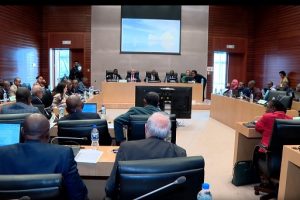Why has the ‘Grand Ethiopian Renaissance Dam (GERD) been increasingly becoming a global issues?’ is a very important question to ask connecting Ethiopia’s ambitious plan to be a prosperous East African nation? This African beacon of prosperity has always wished to set up a successful partnership with neighboring countries and even beyond following a win-win fashion.
“Ethiopia is always thinking of establishing bilateral or trilateral ties with any country in the world which is willing to have ties based on mutual benefit as it has entertained color blind diplomacy. It doesn’t have any discrimination whether they are from East or West, which is not Ethiopia’s business so long as the countries comply with win-win principles ignoring boss-subordinate relationships,” said Foreign Affairs Ministry Spokesperson, Ambasador Dina Mufti.
According to Ambassador Dina, Ethiopia is a sovereign nation which doesn’t need to be dictated about diplomacy as it has been exercising it along with the principles with which one has to comply. So long as a given nation respects Ethiopia’s national interest and sovereignty, they are always welcome.
He further elucidated that our neighbors had better comprehend the significance of cooperation and entertaining equitable as well as just water share. According to him, as Trans boundary water resources are these days under pressure from expanding populations, economic growth, unsustainable patterns of development and the impacts of climate change, it is timely and indispensable to join forces over their management.
There are many obstacles that can prevent countries from strengthening or embracing the joint management of Trans boundary waters in an effective way. For instance, different levels of socioeconomic development and institutional capacity, divergent priorities or conflicting policies, but also an incomplete or biased understanding of the benefits that could be derived from cooperating with neighboring countries are attributable to lack of commitment and delay the process of sharing trans boundary waters, he added.
The hydropower programme enables Ethiopian cities to have abundant and affordable electricity, exporting the surplus to its power-scarce neighbors. As the construction of the GERD is nearing completion, and the a new phase—Dr. Abiy Ahmed’s Homegrown Economic Reform Agenda is well planned to help Ethiopia declare self-sufficient, the world over has provided the country with full attention and scrupulously following its steps.
Without a shadow of doubt, Ethiopia’s ambitious reform plan gathers momentum and it would meet the national agenda it has planned so far. GERD is presented as a national pride and success, as a project that is leading Ethiopia towards a glorious future built upon the conspiracies and futile attempts orchestrated against its prosperity avenue.
Following the ubiquitous large-scale patriotic billboards displayed around the country and effort of providing all citizens with constant updates to spur patriotism since 2011 (when construction work began) through Ethiopian radio and TV channels, everyone has been doing all their level best towards winning public confidence and producing patriotic citizens vowing to work unpaid hours to buy dam bonds, discussing how to support the dam’s construction or celebrating the arrival of the Grand Ethiopian Renaissance Dam.
From all commitments and serious follow ups all citizenry has paid, no matter how poor Ethiopians are, they will pay any sacrifice and made an oath to effectively complete the dam carrying an all-time slogan, “It’s my dam.’ Even the government all the time declares that no earthly power stops us from exercising our rights and damming our rivers so long as our country doesn’t infringe either equitable water share principles and trans boundary rivers conventions.
Beyond electricity generation, flood control, and grand irrigation schemes, the dam is charged with highly symbolic meanings by the Ethiopian ruling elite. As its name suggests, the dam embodies the reawakening of the Ethiopian nation, and it represents an essential element in the process aimed at reinventing and redefining Ethiopia’s identity, so that the country can deal with the challenges and the quarter a century long rivalries posed by ‘divide and rule’ weakening means centering race and religion, he said.
According to Haymanot Mathewos, a hydrologist graduated from Arbaminch water technology, in international politics, the competition for water is a transnational non-traditional security issue, which has serious repercussions for regional stability. Water is a primordial concern that touches on issues of survival and basic sustenance. Rivers are particularly contentious, as they meander across political boundaries and hence are subject to competing interests.
“Most countries perceive themselves as solitary proprietors of the portion of the river that flows through their territory; rivers are regarded as a national resource that states have sovereign rights to utilize as they deem appropriate for their self-interests. However, this mentality has to be altered and turned into a win-win resource share fashion as thinking oneself as an exclusive user or owner absolutely violates planet’s oneness facet,” he added. Rivers are argumentative, of course, because they are a key resource closely knitted into the history of human development. Water resources can be used to improve abject poverty.
He further elaborated that rivers are sources of drinking water, important for navigation, transportation, flood control, irrigation and hydropower generation. They have also multiple uses and are renewable energy resources. Accordingly, there are often conflicts over how rivers should be used. For instance, building dams to generate hydropower affects flood levels, fisheries and navigation.
Here, the management of Trans boundary water resources has gained a central role in the political agenda of countries of the globe. Scholars say water as a reason for either conflict or cooperation. “Yes, the government is responsible for protecting the interests of its country and people in relation to water policy and management. Besides, it has so far succeeded in following an effective, legitimate and comprehensive water resource share proceedings though some riparian countries see it otherwise,” he opined.
As to Haymanot, water security has become a central feature of the global policy itinerary. Climate change, population growth, and pollution are altering the distribution of water resources and the political control of these resources is becoming increasingly contested. These and other water security threats are a source of conflict not only within countries but across international boundaries. He said, “International water politics describes the interactions between governments, non-government organizations, researchers, and other actors that determine how and whether water management issues are addressed.”
As to him, of the over 260 Trans Boundary River and lake basins in the world, many of them are facing great challenges of water sharing between/among riparian countries. The good thing is there are many which are effectively garnering benefits out of cooperation instead of indulged in confrontation. Besides, he said, It is clear that international water resources agreements for Trans Boundary Rivers in the world are based on system analysis models for water planning and allocation.
Ethiopia is beholding new twists and turns both in its national and overseas policy dominion as the incumbent government has adopted political and economic reforms aimed at fostering changes to bring about development. This has consistently provided Ethiopia with an opportunity to fortify its relationship with neighboring counties in particular.
Haymanot said, “The new domestic political and economic reforms and the friendly gestures Abiy Ahmed’s government has made with its neighbors have drawn the attention of the international community to the extent of awarding him with grand prize.” He also said that since appropriate and prudent use of natural resources is indispensible for sustainable and all-encompassing improvement, Ethiopia has to capitalize on green economy strategy whose goal is to achieve a carbon-neutral economy river development.
Thanks to the diligent and visionary leader, the Premier, said Haymanot, the GERD—a symbol of national pride, progress and prosperity, the construction of the GERD is well underway.
Haymanot said, “There is a consensus among experts that intercontinental watercourse agreements need to be more concrete, setting out measures to enforce treaties made and incorporating detailed conflict resolution mechanisms in case disputes erupt. Better cooperation also entails identifying clear yet flexible water allocations and water quality standards, taking hydrological events, changing basin dynamics and societal values into account.”
As learnt from Haymanot, poor or subjective understanding of the benefits being garnered out of cooperation and amicable style with neighboring countries is highly attributable to the disputes and rivalry stance between or among nations sharing the same water.
BY MENGESHA AMARE
The Ethiopian Herald June 4/2021




